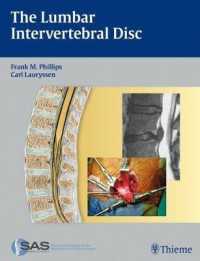- ホーム
- > 洋書
- > ドイツ書
- > Humanities, Arts & Music
- > Linguistics
- > romanic linguistics
Description
As a result of migration, more than 25% of Romanian L1 speakers live outside of Romania and Moldova. In the meantime, a large number of 2nd generation speakers have also become part of this group. Despite this, there has not been much research into Romanian as a language of migrants. The volume Romanian in the Context of Migration brings together contributions on the Romanian language in Europe and North America in the context of current migration linguistics.Das Rumänische wird von über 25 % seiner Primärsprecher - infolge der Migration - außerhalb von Rumänien und Moldau gesprochen. Inzwischen sind zahlreiche Vertreter der 2. Generation hinzugekommen. Dennoch gibt es bislang kaum Untersuchungen zum Rumänischen als Sprache von Migrantinnen und Migranten. Der Band Romanian in the Context of Migration vereint Beiträge zum Rumänischen in Europa und Nordamerika im Kontext der aktuellen Migrationslinguistik. As a result of migration, more than 25% of the native speakers of Romanian now reside outside Romania and Moldova. The present volume focuses on Romanian as a language of migrants (1th and 2nd generation) in various migration contexts: both within and outside Europe. The contributions examine the intergenerational transmission of Romanian, its use by domains, the effects of language contact with Romance, Germanic and Slavic languages, as well as specifi c scenarios of migration and different methods of migration research. PrefaceScenarios of migrationGeorg Kremnitz (Wien)La migration en tant que phénomène (souvent) de longue duréeMethods of migration researchFlorin-Teodor Olariu (Iasi)Homo migrans en tant qu'Homo narrans, ou la migraphie en tant que récit de vieRomanian in migration contexts within EuropeAlexandru-Laurentiu Cohal (Iasi)Appunti sul romeno e sull'italiano parlato della seconda generazione di migranti romeni in Italia Felicia Dumas (Iasi)Les Roumains de France : leur langue maternelle et leur pratique religieuseIoana Jieanu (Ljubljana/Ploiesti)Translanguaging Phenomena in the Communication of Romanian Children in Slovenia Timea Kádas Pickel et Elena Soare (Paris)De la langue de la mère à la langue héritée : comment ne pas en perdre son roumain ? Aspects sociolinguistiques et grammaticaux de la transmission du roumain langue d'héritageAurelia Merlan (München)El rumano de los inmigrantes de segunda generación en Alemania entre conservadurismo e innovaciónIulia Nica (Salamanca/Iasi/Bucuresti)Contactos extraterritoriales recientes entre el rumano y otras lenguas románicas. Estudio de la comunicación por Internet Danielle Omer (Le Mans)Politiques linguistiques familiales : la transmission de la langue roumaine en contexte migratoire Romanian in migration contexts outside EuropeMirela Cherciov (Toronto)Ten Years Later: Reflections on the Dynamics between Two Languages in Romanian Adult Migrants in TorontoAnna-Christine Weirich (Frankfurt am Main)Digital Pluriliteracies of Moldovans in MontréalList of the authors Priv. Doz. Dr. Aurelia Merlan lehrt Romanische Sprachwissenschaft an der Ludwig-Maximilians-Universität München.








